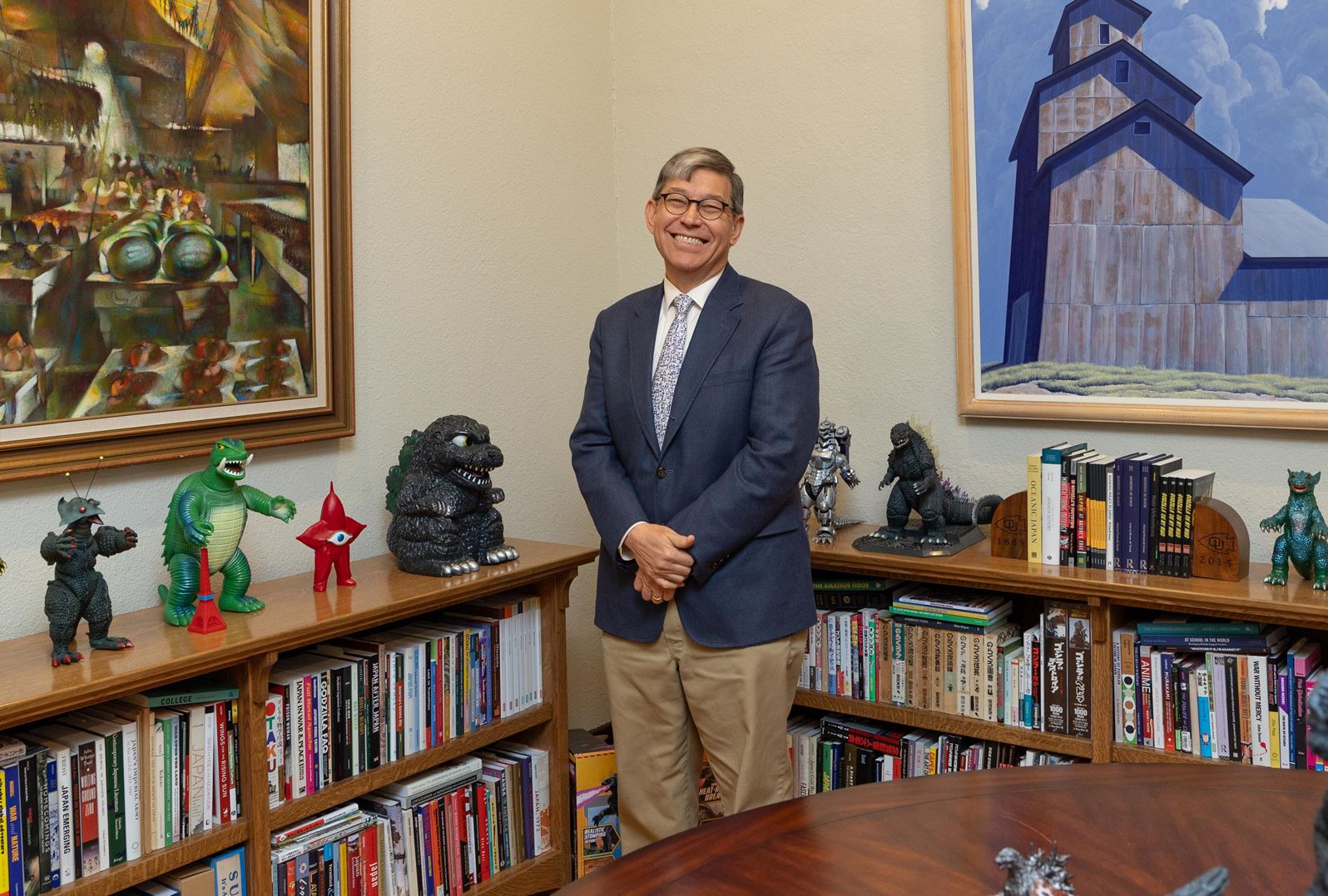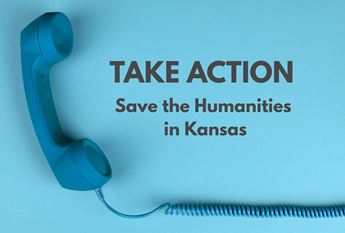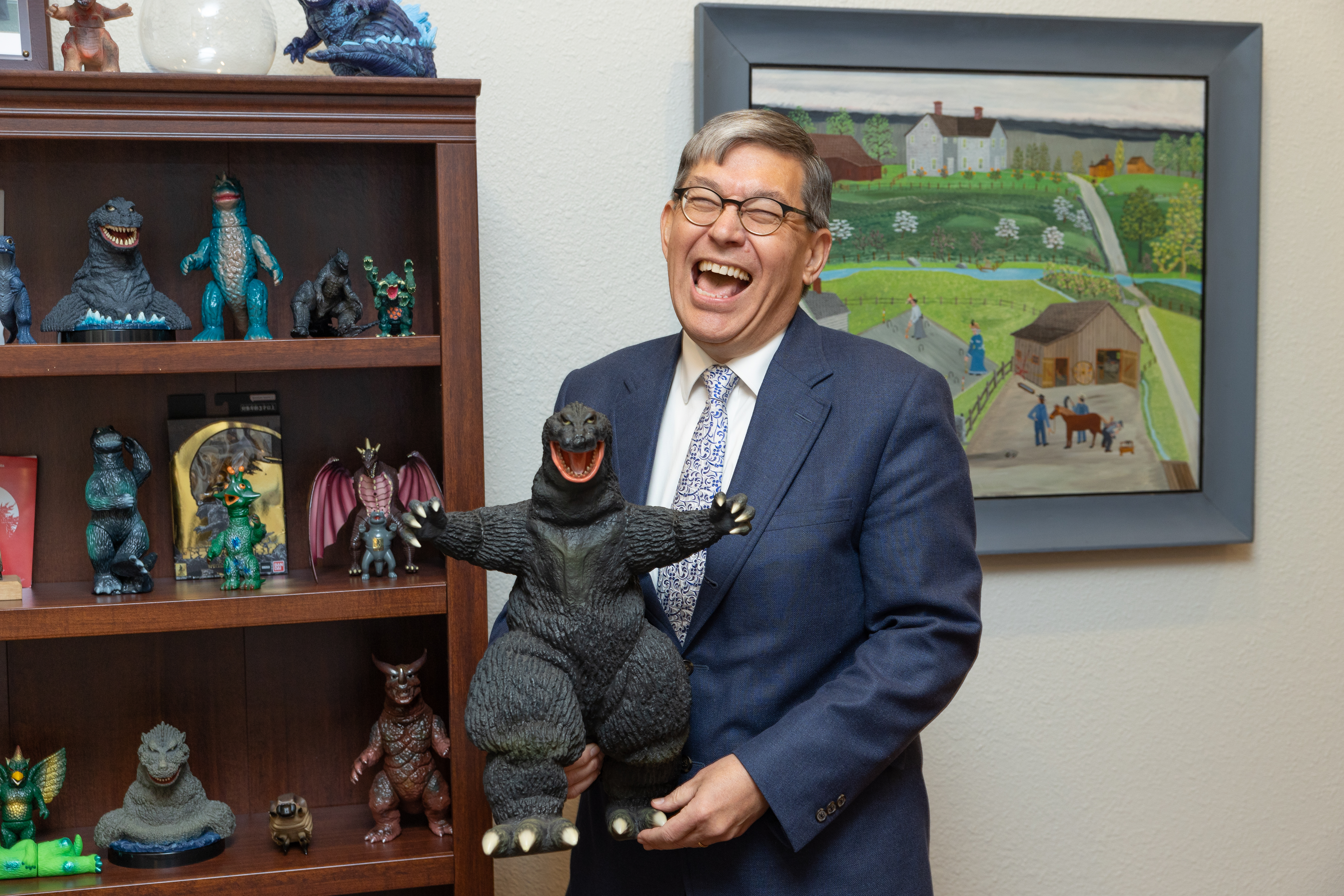

Meet Bill Tsutsui
What’s your Kansas story?
I consider Kansas home now, but when my wife and I were first offered jobs at the University of Kansas in 1993, I had to run to the car and look at the road atlas (remember those?) to figure out just where the state and Lawrence were at. After seventeen years teaching History and English at KU, we headed off to pursue other opportunities, first in Texas and then in Arkansas, but we really missed the people and the place of Kansas. Fortunately, we had the chance to boomerang back to the state in 2021 and we won’t be leaving again.
To me, being a Kansan means being a bit of a contrarian. Kansans see the diversity and beauty in a landscape that most Americans write off as flat and boring. Kansans seek community beyond social media, at county fairs and church socials, across the counters of small-town cafes and in lawn chairs at Veterans Day parades, amidst the pandemonium of Allen Field House and in public library book clubs. Kansans have no time for the flash of the coasts or the swagger of Texas, but share a deeply rooted pragmatism, a refreshing directness, and an uncanny ability to say more with fewer words. I have always found Kansas to be an unpretentious, welcoming, and endlessly surprising place.
Describe what you do now. What inspires you about what you do?
I serve as Chancellor and Professor of History at Ottawa University, a private comprehensive institution that grew from a Baptist mission to the Ottawa Tribe on the banks of the Marais des Cygnes River. In addition to our historic campus in Ottawa, we have campuses for adult, graduate, and professional education in Overland Park and in Wisconsin, as well as an eight-year-old residential campus in the suburbs of Phoenix, Arizona. American higher education is undergoing some wrenching changes right now, but I take joy in working with students of diverse ages and backgrounds, and I am energized by collaborating with smart, committed people to tackle tough problems.
When you hear the word “humanities,” what comes to mind?
The most engrossing novel I’ve ever read. The most provocative ideas I’ve ever heard. The most disturbing (or inspiring) artworks I’ve ever seen. The most confounding questions that I have ever contemplated. All the things – weird and wonderful, comic and tragic, absolutely certain and forever unknown – that make us human.
Share a memory or experience when the humanities—whether art, literature, music, or a film—deeply resonated with you or left a lasting impression?
When my wife and I first arrived in Kansas, we imagined we wouldn’t be around too long. Surely Stanford or Dartmouth would call up one day and offer us jobs on a coast somewhere. Eventually we realized that we really liked the state and the people here: not only were we content to stay but we were genuinely enthusiastic about putting down some roots in Kansas. Our light-bulb moment took place in the Sandzen Gallery in Lindsborg one sticky summer afternoon. We were absolutely staggered by the beauty and power of Birger Sandzen’s colorful landscapes of the Smoky River Valley. Those dramatic, unforgettable paintings allowed us to see Kansas with new eyes and appreciate the hidden richness of the state in new ways. More than 30 years later, I still feel an intense rush of emotion and awe when I walk into that unassuming small-town museum.
Why do stories matter in Kansas today?
As a historian, I consider myself a collector, transmitter, and interpreter of stories. Despite our obsession these days with numbers and data, I have always found that we humans find stories more compelling than statistics. The most meaningful stories, unlike any statistics I know of, speak to our hearts (or tickle our funny bones) and stick in our minds. Stories are fundamentally social creations, narratives to be heard and shared and embellished and reflected upon. Stories are the bedrock of cultures and communities, touchstones that help us all make sense of a complicated world, negotiate relationships with others, and celebrate a common humanity.
What about your community inspires you? What about Kansas inspires you?
My wife and I have lived in a number of big cities and college towns over the years, but we have never felt more at home than we do in Ottawa (population 12,000, give or take). People are welcoming and care about the community, “bad traffic” means that there are three cars at a stop sign, we have a fantastic local history museum and city brass band, and I can walk (in fifteen minutes or less) to the doctor, dentist, barber, bank, movie theater, emergency room, and a couple great coffee shops. Sure, Ottawa and Kansas have all the challenges which other cities and states do, but I find it hard to imagine better places to live.
What do you wish people knew or understood about Kansas?
Don’t think you are an expert on Kansas just because you’ve seen The Wizard of Oz. Kansas is not as flat as a pancake: take a drive through the Flint Hills or try walking up Mount Oread from Massachusetts Street. Kansas is not boring: our big skies set your imagination free and our measured pace of life allows you to focus on deeper experiences. And, as one glance at me will reveal, not every Kansan has blond hair and blue eyes . . . or ruby slippers.
What does the future of Kansas look like to you?
As much as I hope Kansas doesn’t change too much, of course it will. Some change will be welcome, of course, like increasing ethnic diversity, better connectivity through technology, and healthier, more vibrant communities (thanks to the work of Humanities Kansas and countless other organizations and individuals). But I worry about the depletion of the Ogallala Aquifer and the sustainability of Great Plains agriculture, the future of higher education in a world increasingly focused on immediate gratification rather than long-term investment, and the polarization of American society and its threat to Kansas traditions of compromise and civil discourse. As an eternal optimist, I would like to think that the future of Kansas will be free of discouraging words and cloudy skies, but all of us who love this state are going to have to work hard – and work together – to keep Kansas such a unique and special place.
What is a cultural attraction in Kansas that everyone should experience that is uniquely Kansas?
My top two, both of which are quirky and a bit disturbing, are the John Steuart Curry murals in the State Capitol in Topeka (John Brown is wonderfully terrifying) and the taxidermy in the Natural History Museum at the University of Kansas (especially Comanche, the equine survivor of Little Bighorn, standing ever at attention). A bonus recommendation is the Walker Art Gallery at the Garnett Public Library, a gift to the community from a native son who became an influential gallery owner in New York City and an important advocate for regionalist art in the 1930s and 1940s.
What is a Kansas culinary dish or restaurant everyone should try?
This is a hard one, since there are so many good choices! If I had to name a single unmissable meal, it would be a sack of Cozy Burgers from the Cozy Inn in downtown Salina. Soft and steamy and pungent with grilled onions, these world-class sliders are a nostalgic trip to the pre-franchise roots of American fast food. Just don’t eat them in your car, because that distinctive Cozy perfume is forever.
Close runners-up are the sliced pork sandwich (with the distinctive celery-salt-forward sauce) at Rosedale Bar-B-Q in Kansas City, Kansas; a loose-meat sandwich, onion rings, and the homemade root beer at NuWay in Wichita (especially the atmospheric old West Douglas location); and the brown bread flavor (made with Grape Nuts) at G’s Frozen Custard in Topeka.
What are a few of your favorite reads and why?
On Kansas, I am a huge fan of PrairyErth, William Least Heat-Moon’s celebrated “deep map” of Chase County. It weighs about as much as a cinderblock, so can seem intimidating, but it is a rich and rewarding mosaic of history, geology, literature, ecology, and personal reflection that evokes a “sense of place” like few other books I have ever read. Otherwise, I am a real sucker for British books about talking animals: the Paddington and Winnie-the-Pooh series, Watership Down (the best volume on leadership ever written), and the now-underappreciated classic Tarka the Otter by Henry Williamson (which is both exhilarating and heartbreaking).




